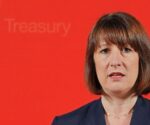Rachel Reeves could make huge change to pensions in November | Personal Finance | Finance
Chancellor Rachel Reeves is set to make a huge change to pensions in November as part of the autumn Budget.
The annual Budget, which will take place on November 26, is one of the most significant events of the year. It outlines tax, spending and borrowing plans for the year ahead, which will impact both individuals, businesses and the UK economy as a whole. Ms Reeves has already acknowledged that she was looking at possible tax rises and spending cuts in her Budget, as well as potential changes to Cash ISA limits, inheritance tax rules and limitations on how much free cash people can access from their pension. But one other huge pension change is also thought to be on the cards and it could affect how much money people will have by the time they reach retirement.
According to speculation from financial experts, pension ‘salary sacrifice’ schemes could be restricted in the autumn Budget. A salary sacrifice scheme is essentially an arrangement between employers and employees which sees workers give up part of their salary in exchange for benefits, such as extra pension contributions. This results in lower National Insurance and income tax payments for both and sees employers redirect the sacrificed salary amount into an employee’s workplace pension, allowing workers to save money on tax and increase their pension savings.
But according to experts, such salary sacrifice schemes could be scaled back in the Budget to regain some of the tax revenue lost through these, such as capping the limit that employees can sacrifice. This would impact how much workers can save into private pensions and ultimately reduce the amount of savings they have come retirement.
Financial expert Nick Sudbury at Fidelity International said: “Many employees choose to ‘sacrifice’ part of their salary in exchange for higher contributions into their workplace pension. This can be tax-efficient for both the employee and the employer, as pension contributions – unlike salary payments – are not subject to income tax or National Insurance. This option has become more attractive for employers following April’s increase in their NI rates.
“But speculation is rife that this could be scaled back, following the publication of HMRC research into how employers might react should the rules be changed. Sir Steve Webb, a pensions minister in the coalition government, said this research suggested changes to salary sacrifice were ‘firmly on the Treasury’s agenda’. However, it should also be noted that it was the previous government that commissioned this HMRC research.
“There are several ways the government could limit salary sacrifice and recoup some of the tax revenue lost through these schemes. One option might be to cap the amount individuals can sacrifice – effectively targeting higher earners who are maximising these arrangements. However, the government could take a broader brush approach and remove the NI exemption, or both the NI and tax exemption, on all of these salary sacrifice payments.”
Experts at Croner-i Tax and Accounting added: “Previous Chancellors have shied away from taking this ‘low hanging fruit’ because of the furore that changes to pensions tax causes – and because saving for retirement has generally been seen as something to encourage.
“One subtle way the Chancellor could feasibly seek to cut some of this cost would be by limiting the NIC exemption to say £2,000 to £5,000 of total salary sacrificed for all benefit types – after all, the self-employed cannot benefit from this perk.
“However, such a change would still be unpopular and reduce incentives for employers to offer salary sacrifice schemes and for employees to make suitable provision for their retirement. It would also add new burdens on employers who would have to calculate the excess if people went over the threshold.
“Employees currently using benefit in kind incentives through salary sacrifice schemes could also lose out if the current incentives were reduced. This could have a particularly big impact on those taking advantage of such schemes to lease electric vehicles – another arrangement previously encouraged in the context of the path to net zero. So, something for employers to be aware of and as for now, all we can say is ‘watch this space’.”
When asked about potential tax rises this week, Rachel Reeves said: “Challenges are being thrown our way, whether that is the geopolitical uncertainties, the conflicts around the world, the increased tariffs and barriers to trade and now this review looking at how productive our economy has been in the past and then projecting that forward.
“But I won’t duck those challenges. Of course, we’re looking at tax and spending as well, but the numbers will always add up with me as Chancellor because we saw just three years ago what happens when a government, where the Conservatives, lost control of the public finances – inflation and interest rates went through the roof.”








